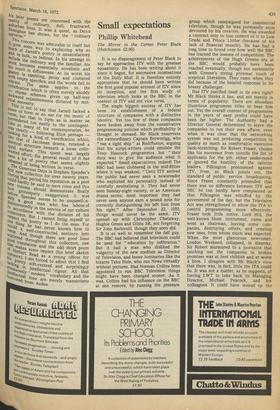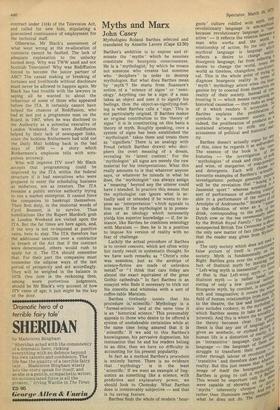Small expectations
Philip Whitehead
The Mirror in the Corner Peter Black (Hutchinson E2.90) It is no disparagement of Peter Black to say he approaches ITV with the greatest equanimity. He has been writing about it since it began, for successive incarnations of the Daily Mail. It is therefore entirely appropriate that he should have written the first good popular account of ITV since its inception, and the first study of television which looks at the BBC in the context of ITV and not vice versa.
The single biggest success of ITV has been its establishment of a federal structure of companies with a distinctive identity. Yet too few of these companies have broken away from the conservative programming policies which profitability is thought to demand. Mr Black resurrects the extraordinary Captain Brownrigg, who " ran a tight ship" at Rediffusion, arguing that his script-writers could emulate the Tony Hancock programmes but their duty was to give the audience what it expected." Small expectations, indeed! The BBC had been clobbered in the mid-fifties where it was weakest. "Until ITV arrived the public had never seen a newsreader who exploited his personality instead of carefully neutralising it. They had never seen Sunday-night variety, or an American drama series; most important they had never seen anyone earn a pound note for correctly distinguishing his left foot from his right." After September 22, 1955, things would never be the same. opened up with Christopher Chataway, Hughie Green and Gibbs SR, not forgetting Sir John Barbirolli, though they soon did.
It is as well to remember the fall guy. The BBC had believed that television could be used for "education by infiltration." But it had a man who disliked the vulgarity of the new medium as Director • of Television, and lesser luminaries like the bizarre Tahu Hole, who ran News virtually without pictures. Had Norman Collins been appointed to run BBC Television things might have been changed sooner. As it was, Collins had his influence on the BBC at one remove, by running the pressure group which campaigned for commercial television, though he was personally soon devoured by his creation. He was awarded a contract only to lose control of it to Lew Grade and Prince Littler (because of his lack of financial muscle). He has had a long time to brood over how well the BBC has learned the lessons of competition. The achievements of the Hugh Greene era at the BBC would probably have been reached eventually, though not necessarily with Greene's strong pPrsonal touch of sceptical liberalism. They came when they did because of the belated response to its brassy challenger.
Has ITV justified itself in its own right? Mr Black thinks it has, and not merely in terms of popularity. There are abundant illustrious programme titles to bear him out. Yet the overall content of programmes in the years of easy profits could have been far higher. The Authority had a Director General determined to leave the companies to run their own affairs, even when it was clear that the networking system was not producing competition in quality so much as comfortable executive back-scratching. Sir Robert Fraser, chosen like his successor from outside the list of applicants for the job, either under-rated or ignored the hostility of the opinion leaders. Pilkington pronounced against ITV, from, as Black points out, the standard of public service broadcasting. Since Fraser constantly pretended that there was no difference between ITV and BBC he can hardly have complained at that. Pilkington was rebuffed by the government of the day, but the Television Act was strengthened to allow the ITA to control programming more effectively. Fraser took little notice. Lord Hill, the well-known blunt instrument, came and went as chairman, leaving some companies, destroying others, and creating new ones, from whom much was expected. When the most glamorous newcomer, London Weekend, collapsed, in disarray, Sir Robert murmured to a journalist that catching out the companies in broken promises was at best childish and at worst a bore. I disagree with Mr Black's view that there was, in fact, little the ITA could do. It was not a matter, as he suggests, of forcing LWT to take back its Managing Director, Michael Peacock, and his colleagues. It could have wound up the contract under 11(4) of the Television Act, and called for new bids, stipulating a guaranteed continuance of employment for the technical staff.
Otherwise, Mr Black's assessment of what went wrong at the re-allocation of contracts cannot be faulted. The lack of adequate explanation to the unlucky burned deep. Why was TWW axed and not Scottish Television? Why was Rediffusion forced to become the junior partner of ABC? The casual making or breaking of fortunes and livelihoods without disclosure must never be allowed to happen again. Mr Black has had trouble with the lawyers in saying all he wanted to about the behaviour of some of those who appeared before the ITA. It certainly cannot have helped the chances of Rediffusion, who had at last put a programme man on the Board, in 1967, when he was disclosed to the Authority as a potential executive of London Weekend. Nor were Rediffusion helped by their lack of newspaper links, since the luckless Rothermere had sold out the Daily Mail holding back in the bad days of 1956 — a story which Rothermere's employee tells with scrupulous accuracy.
Who will improve ITV now? Mr Black accepts that programming could be improved by the ITA within the federal structure if it had executives who were prepared to enter the scheduling business as midwives, not as creators. The ITA remains a public service authority trying to run a market enterprise. It cannot force the companies to bankrupt themselves. Their first duty, in the immortal words of Cyril Bennett, is to survive. Thus humiliations like the Rupert Murdoch grab at London Weekend are visited upon the ITA. But the fat times are here again, and, if the levy is not re-imposed at punitive rates, here to stay. The ITA therefore has the additional sanction over a contractor in breach of the Act that if the contract were determined, others would rush to apply for it. The ITA should remember that. For their part the companies must remember the adipose ways of the last period of prosperity and act accordingly. They will be weighed in the balance in 1976. One item in the reckoning then, among more portentous judgments, should be Mr Black's wry account of how ITV came of age; it just might be the key of the door.











































 Previous page
Previous page